2006 MERCEDES-BENZ SPRINTER air condition
[x] Cancel search: air conditionPage 133 of 2305
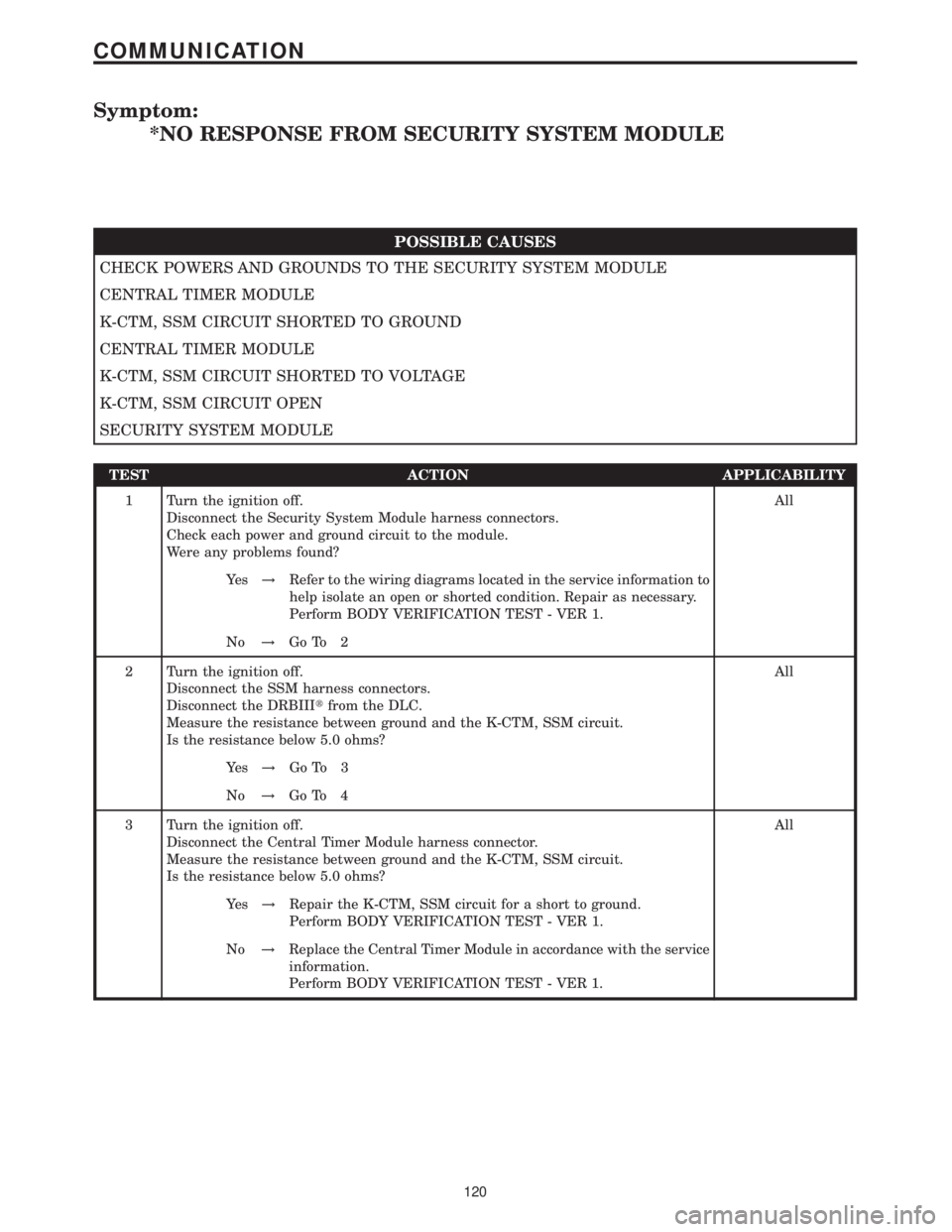
Symptom:
*NO RESPONSE FROM SECURITY SYSTEM MODULE
POSSIBLE CAUSES
CHECK POWERS AND GROUNDS TO THE SECURITY SYSTEM MODULE
CENTRAL TIMER MODULE
K-CTM, SSM CIRCUIT SHORTED TO GROUND
CENTRAL TIMER MODULE
K-CTM, SSM CIRCUIT SHORTED TO VOLTAGE
K-CTM, SSM CIRCUIT OPEN
SECURITY SYSTEM MODULE
TEST ACTION APPLICABILITY
1 Turn the ignition off.
Disconnect the Security System Module harness connectors.
Check each power and ground circuit to the module.
Were any problems found?All
Ye s!Refer to the wiring diagrams located in the service information to
help isolate an open or shorted condition. Repair as necessary.
Perform BODY VERIFICATION TEST - VER 1.
No!Go To 2
2 Turn the ignition off.
Disconnect the SSM harness connectors.
Disconnect the DRBIIItfrom the DLC.
Measure the resistance between ground and the K-CTM, SSM circuit.
Is the resistance below 5.0 ohms?All
Ye s!Go To 3
No!Go To 4
3 Turn the ignition off.
Disconnect the Central Timer Module harness connector.
Measure the resistance between ground and the K-CTM, SSM circuit.
Is the resistance below 5.0 ohms?All
Ye s!Repair the K-CTM, SSM circuit for a short to ground.
Perform BODY VERIFICATION TEST - VER 1.
No!Replace the Central Timer Module in accordance with the service
information.
Perform BODY VERIFICATION TEST - VER 1.
120
COMMUNICATION
Page 135 of 2305
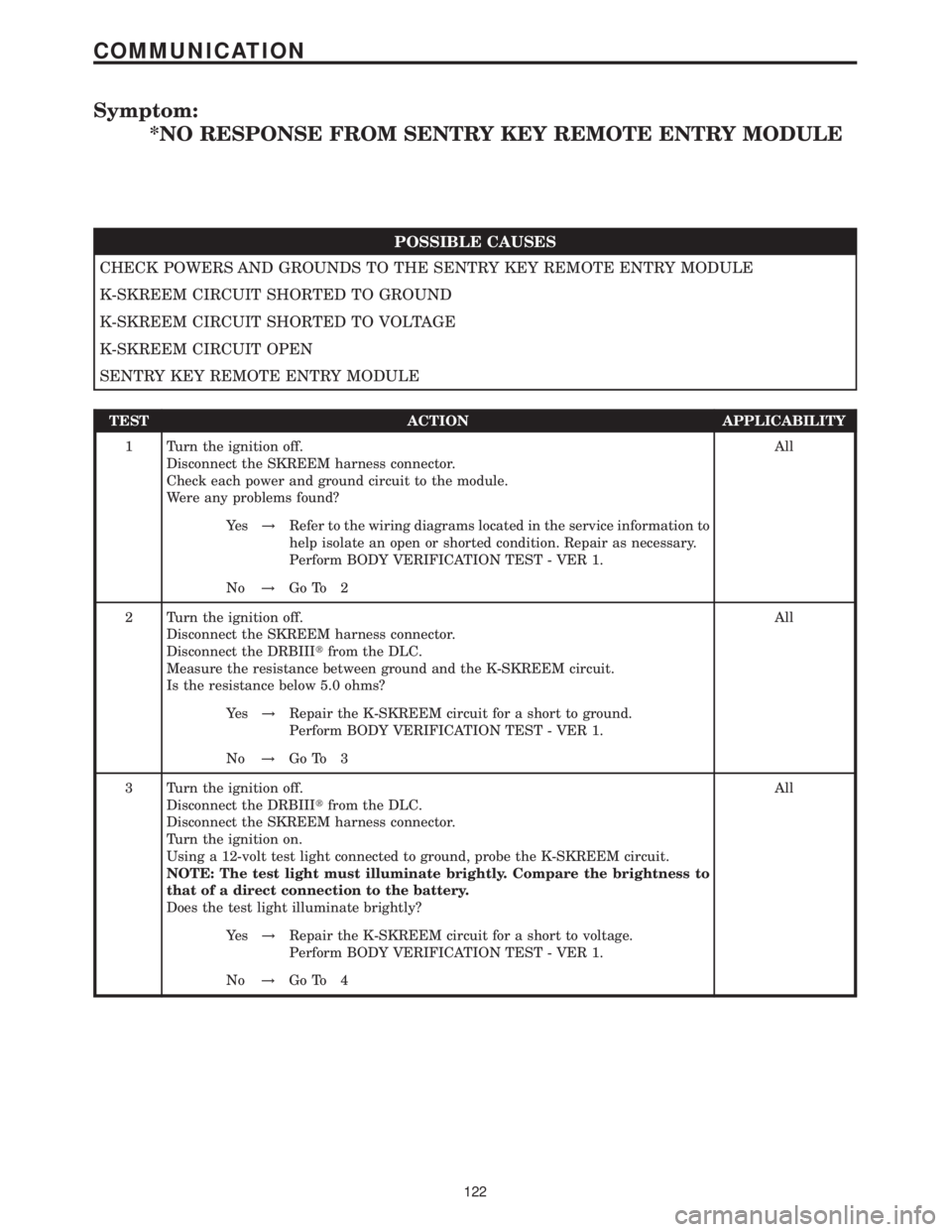
Symptom:
*NO RESPONSE FROM SENTRY KEY REMOTE ENTRY MODULE
POSSIBLE CAUSES
CHECK POWERS AND GROUNDS TO THE SENTRY KEY REMOTE ENTRY MODULE
K-SKREEM CIRCUIT SHORTED TO GROUND
K-SKREEM CIRCUIT SHORTED TO VOLTAGE
K-SKREEM CIRCUIT OPEN
SENTRY KEY REMOTE ENTRY MODULE
TEST ACTION APPLICABILITY
1 Turn the ignition off.
Disconnect the SKREEM harness connector.
Check each power and ground circuit to the module.
Were any problems found?All
Ye s!Refer to the wiring diagrams located in the service information to
help isolate an open or shorted condition. Repair as necessary.
Perform BODY VERIFICATION TEST - VER 1.
No!Go To 2
2 Turn the ignition off.
Disconnect the SKREEM harness connector.
Disconnect the DRBIIItfrom the DLC.
Measure the resistance between ground and the K-SKREEM circuit.
Is the resistance below 5.0 ohms?All
Ye s!Repair the K-SKREEM circuit for a short to ground.
Perform BODY VERIFICATION TEST - VER 1.
No!Go To 3
3 Turn the ignition off.
Disconnect the DRBIIItfrom the DLC.
Disconnect the SKREEM harness connector.
Turn the ignition on.
Using a 12-volt test light connected to ground, probe the K-SKREEM circuit.
NOTE: The test light must illuminate brightly. Compare the brightness to
that of a direct connection to the battery.
Does the test light illuminate brightly?All
Ye s!Repair the K-SKREEM circuit for a short to voltage.
Perform BODY VERIFICATION TEST - VER 1.
No!Go To 4
122
COMMUNICATION
Page 137 of 2305
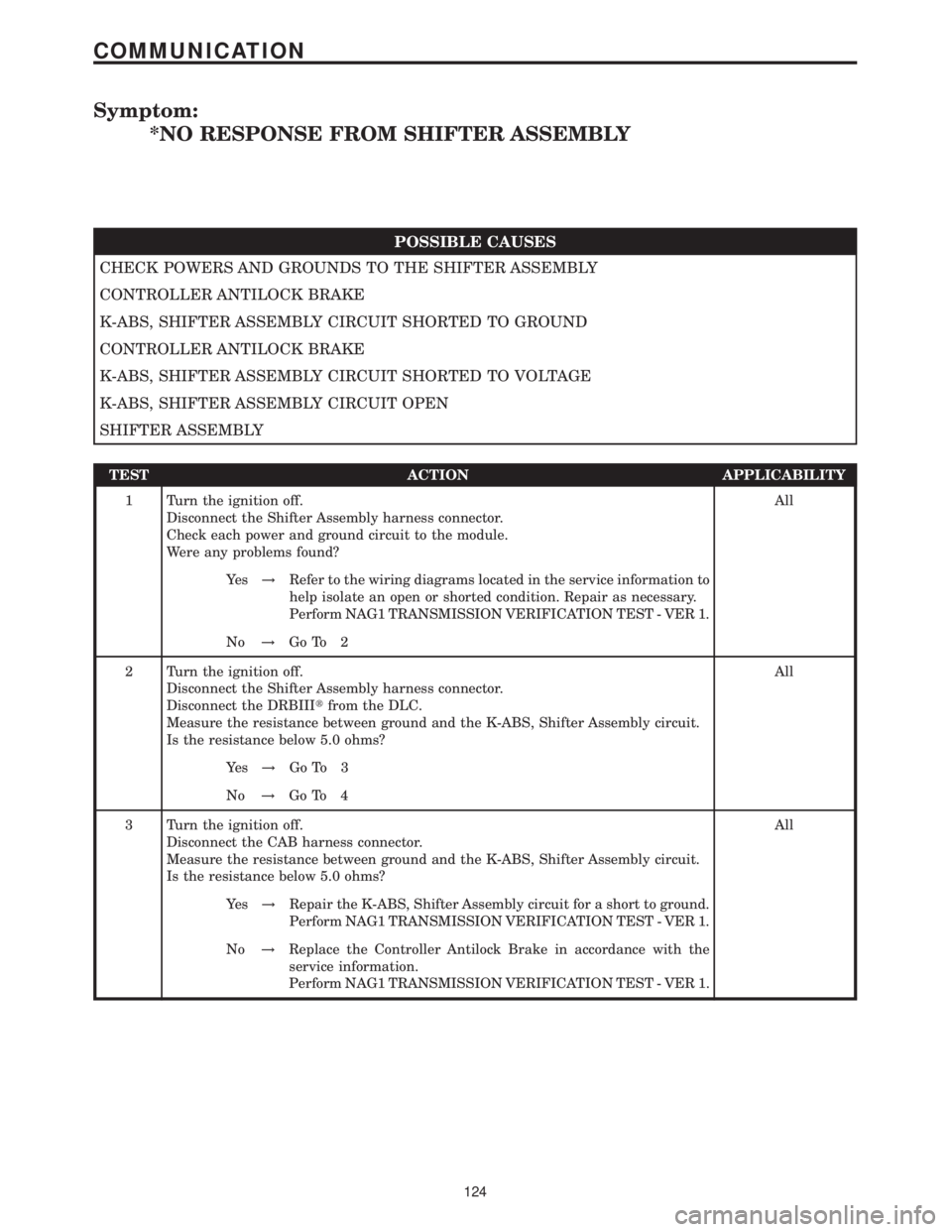
Symptom:
*NO RESPONSE FROM SHIFTER ASSEMBLY
POSSIBLE CAUSES
CHECK POWERS AND GROUNDS TO THE SHIFTER ASSEMBLY
CONTROLLER ANTILOCK BRAKE
K-ABS, SHIFTER ASSEMBLY CIRCUIT SHORTED TO GROUND
CONTROLLER ANTILOCK BRAKE
K-ABS, SHIFTER ASSEMBLY CIRCUIT SHORTED TO VOLTAGE
K-ABS, SHIFTER ASSEMBLY CIRCUIT OPEN
SHIFTER ASSEMBLY
TEST ACTION APPLICABILITY
1 Turn the ignition off.
Disconnect the Shifter Assembly harness connector.
Check each power and ground circuit to the module.
Were any problems found?All
Ye s!Refer to the wiring diagrams located in the service information to
help isolate an open or shorted condition. Repair as necessary.
Perform NAG1 TRANSMISSION VERIFICATION TEST - VER 1.
No!Go To 2
2 Turn the ignition off.
Disconnect the Shifter Assembly harness connector.
Disconnect the DRBIIItfrom the DLC.
Measure the resistance between ground and the K-ABS, Shifter Assembly circuit.
Is the resistance below 5.0 ohms?All
Ye s!Go To 3
No!Go To 4
3 Turn the ignition off.
Disconnect the CAB harness connector.
Measure the resistance between ground and the K-ABS, Shifter Assembly circuit.
Is the resistance below 5.0 ohms?All
Ye s!Repair the K-ABS, Shifter Assembly circuit for a short to ground.
Perform NAG1 TRANSMISSION VERIFICATION TEST - VER 1.
No!Replace the Controller Antilock Brake in accordance with the
service information.
Perform NAG1 TRANSMISSION VERIFICATION TEST - VER 1.
124
COMMUNICATION
Page 139 of 2305
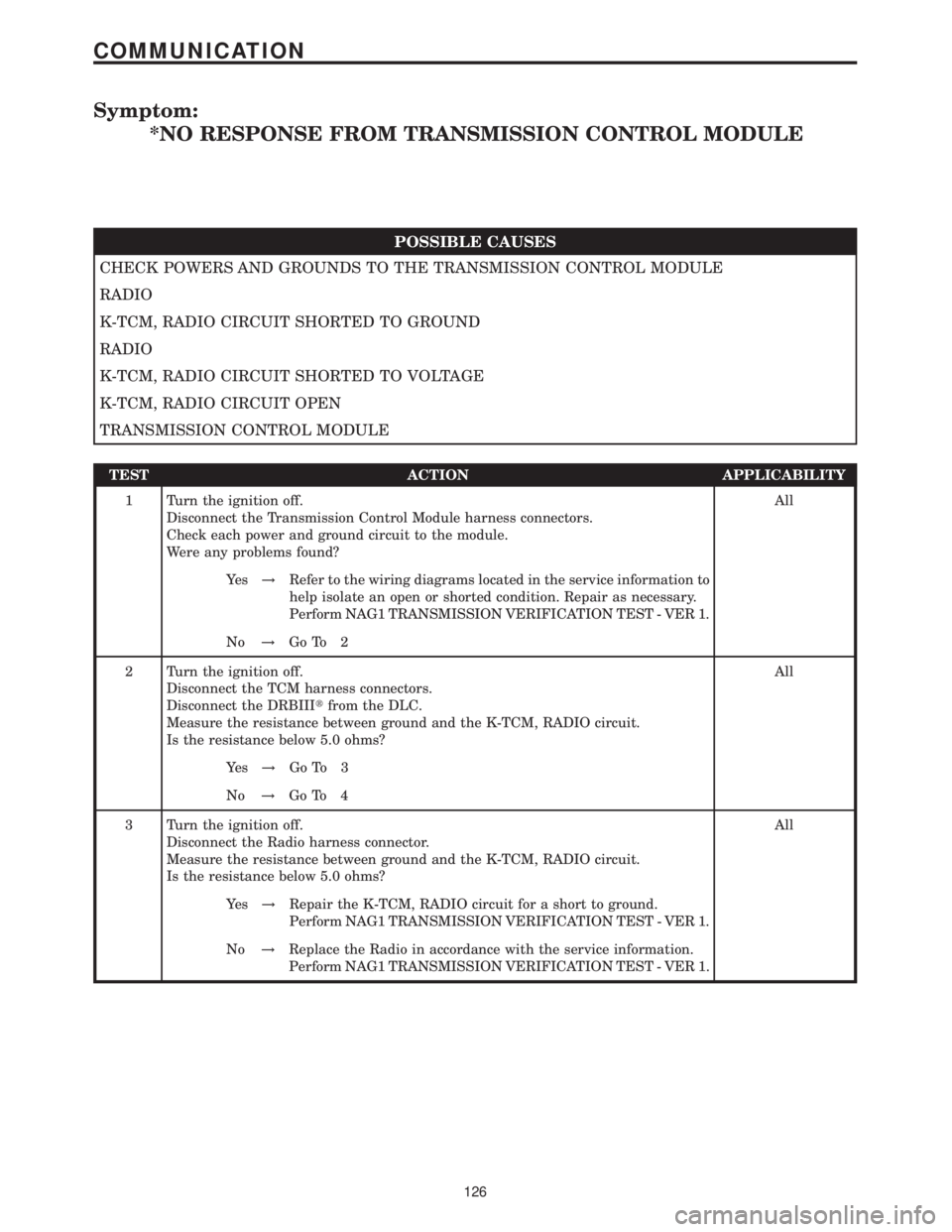
Symptom:
*NO RESPONSE FROM TRANSMISSION CONTROL MODULE
POSSIBLE CAUSES
CHECK POWERS AND GROUNDS TO THE TRANSMISSION CONTROL MODULE
RADIO
K-TCM, RADIO CIRCUIT SHORTED TO GROUND
RADIO
K-TCM, RADIO CIRCUIT SHORTED TO VOLTAGE
K-TCM, RADIO CIRCUIT OPEN
TRANSMISSION CONTROL MODULE
TEST ACTION APPLICABILITY
1 Turn the ignition off.
Disconnect the Transmission Control Module harness connectors.
Check each power and ground circuit to the module.
Were any problems found?All
Ye s!Refer to the wiring diagrams located in the service information to
help isolate an open or shorted condition. Repair as necessary.
Perform NAG1 TRANSMISSION VERIFICATION TEST - VER 1.
No!Go To 2
2 Turn the ignition off.
Disconnect the TCM harness connectors.
Disconnect the DRBIIItfrom the DLC.
Measure the resistance between ground and the K-TCM, RADIO circuit.
Is the resistance below 5.0 ohms?All
Ye s!Go To 3
No!Go To 4
3 Turn the ignition off.
Disconnect the Radio harness connector.
Measure the resistance between ground and the K-TCM, RADIO circuit.
Is the resistance below 5.0 ohms?All
Ye s!Repair the K-TCM, RADIO circuit for a short to ground.
Perform NAG1 TRANSMISSION VERIFICATION TEST - VER 1.
No!Replace the Radio in accordance with the service information.
Perform NAG1 TRANSMISSION VERIFICATION TEST - VER 1.
126
COMMUNICATION
Page 141 of 2305
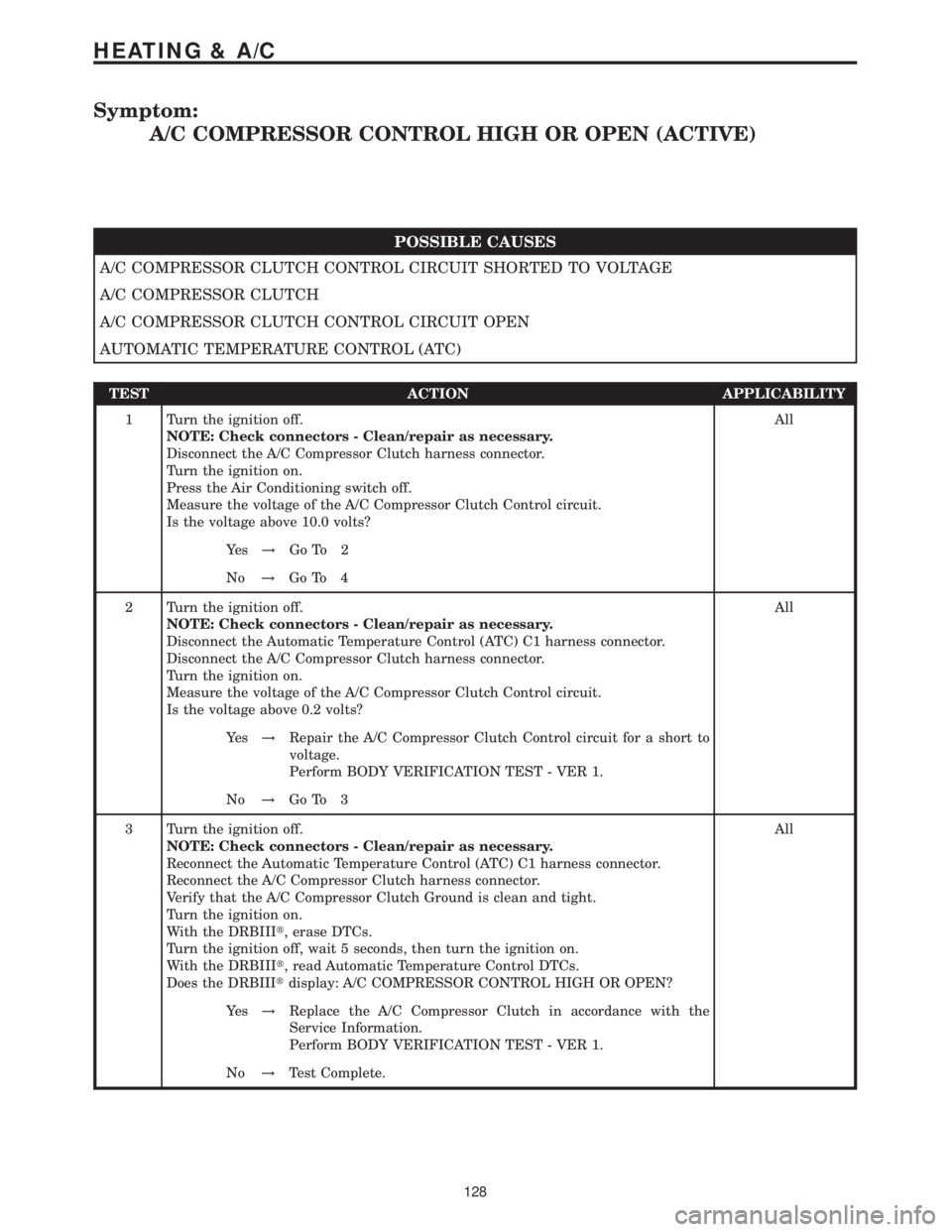
Symptom:
A/C COMPRESSOR CONTROL HIGH OR OPEN (ACTIVE)
POSSIBLE CAUSES
A/C COMPRESSOR CLUTCH CONTROL CIRCUIT SHORTED TO VOLTAGE
A/C COMPRESSOR CLUTCH
A/C COMPRESSOR CLUTCH CONTROL CIRCUIT OPEN
AUTOMATIC TEMPERATURE CONTROL (ATC)
TEST ACTION APPLICABILITY
1 Turn the ignition off.
NOTE: Check connectors - Clean/repair as necessary.
Disconnect the A/C Compressor Clutch harness connector.
Turn the ignition on.
Press the Air Conditioning switch off.
Measure the voltage of the A/C Compressor Clutch Control circuit.
Is the voltage above 10.0 volts?All
Ye s!Go To 2
No!Go To 4
2 Turn the ignition off.
NOTE: Check connectors - Clean/repair as necessary.
Disconnect the Automatic Temperature Control (ATC) C1 harness connector.
Disconnect the A/C Compressor Clutch harness connector.
Turn the ignition on.
Measure the voltage of the A/C Compressor Clutch Control circuit.
Is the voltage above 0.2 volts?All
Ye s!Repair the A/C Compressor Clutch Control circuit for a short to
voltage.
Perform BODY VERIFICATION TEST - VER 1.
No!Go To 3
3 Turn the ignition off.
NOTE: Check connectors - Clean/repair as necessary.
Reconnect the Automatic Temperature Control (ATC) C1 harness connector.
Reconnect the A/C Compressor Clutch harness connector.
Verify that the A/C Compressor Clutch Ground is clean and tight.
Turn the ignition on.
With the DRBIIIt, erase DTCs.
Turn the ignition off, wait 5 seconds, then turn the ignition on.
With the DRBIIIt, read Automatic Temperature Control DTCs.
Does the DRBIIItdisplay: A/C COMPRESSOR CONTROL HIGH OR OPEN?All
Ye s!Replace the A/C Compressor Clutch in accordance with the
Service Information.
Perform BODY VERIFICATION TEST - VER 1.
No!Test Complete.
128
HEATING & A/C
Page 143 of 2305

Symptom List:
A/C COMPRESSOR CONTROL HIGH OR OPEN (STORED)
A/C COMPRESSOR CONTROL SHORTED LOW (STORED)
AIR OUTLET TEMP SENSOR HIGH OR OPEN (STORED)
AIR OUTLET TEMP SENSOR SHORTED LOW (STORED)
AUX FAN RELAY CONTROL HIGH OR OPEN (STORED)
AUX FAN RELAY CONTROL SHORTED LOW (STORED)
BLOWER STAGE 1 HIGH OR OPEN (STORED)
BLOWER STAGE 1 SHORTED LOW (STORED)
CABIN HEATER CONTROL HIGH OR OPEN (STORED)
CABIN HEATER CONTROL SHORTED LOW (STORED)
CIRC PUMP CONTROL HIGH OR OPEN (STORED)
CIRC PUMP CONTROL SHORTED LOW (STORED)
EVAP TEMP SENSOR HIGH OR OPEN (STORED)
EVAP TEMP SENSOR SHORTED LOW (STORED)
NO COMMUNICATION BUS (STORED)
NO COMMUNICATION WITH ECM (STORED)
NO COMMUNICATION WITH IC (STORED)
RECIRC AIR SOLENOID CONTROL HIGH OR OPEN (STORED)
RECIRC AIR SOLENOID CONTROL SHORTED LOW (STORED)
REFRIG PRESS SENSOR HIGH OR OPEN (STORED)
REFRIG PRESS SENSOR SHORTED LOW (STORED)
WATER CYCLE VALVE CONTROL HIGH OR OPEN (STORED)
WATER CYCLE VALVE CONTROL SHORTED LOW (STORED)
Test Note: All symptoms listed above are diagnosed using the same tests.
The title for the tests will be A/C COMPRESSOR CONTROL
HIGH OR OPEN (STORED).
When Monitored and Set Condition:
NO COMMUNICATION BUS (STORED)
When Monitored: With the ignition on.
Set Condition: This DTC will set if the Automatic Temperature Control (ATC) fails to
receive all module messages.
NO COMMUNICATION WITH ECM (STORED)
When Monitored: With the ignition on.
Set Condition: This DTC will set if the Automatic Temperature Control (ATC) fails to
receive all messages from the ECM.
130
HEATING & A/C
Page 144 of 2305
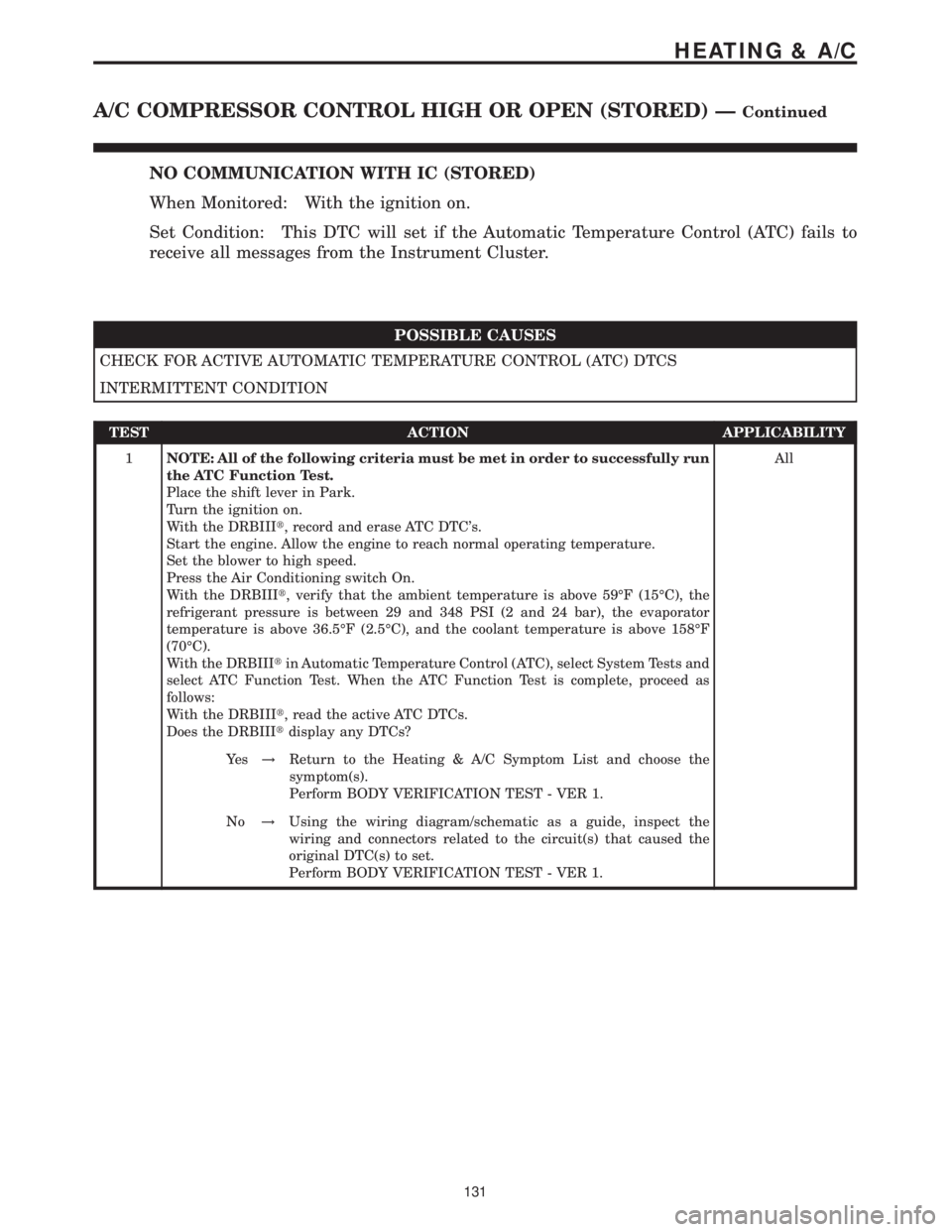
NO COMMUNICATION WITH IC (STORED)
When Monitored: With the ignition on.
Set Condition: This DTC will set if the Automatic Temperature Control (ATC) fails to
receive all messages from the Instrument Cluster.
POSSIBLE CAUSES
CHECK FOR ACTIVE AUTOMATIC TEMPERATURE CONTROL (ATC) DTCS
INTERMITTENT CONDITION
TEST ACTION APPLICABILITY
1NOTE: All of the following criteria must be met in order to successfully run
the ATC Function Test.
Place the shift lever in Park.
Turn the ignition on.
With the DRBIIIt, record and erase ATC DTC's.
Start the engine. Allow the engine to reach normal operating temperature.
Set the blower to high speed.
Press the Air Conditioning switch On.
With the DRBIIIt, verify that the ambient temperature is above 59ÉF (15ÉC), the
refrigerant pressure is between 29 and 348 PSI (2 and 24 bar), the evaporator
temperature is above 36.5ÉF (2.5ÉC), and the coolant temperature is above 158ÉF
(70ÉC).
With the DRBIIItin Automatic Temperature Control (ATC), select System Tests and
select ATC Function Test. When the ATC Function Test is complete, proceed as
follows:
With the DRBIIIt, read the active ATC DTCs.
Does the DRBIIItdisplay any DTCs?All
Ye s!Return to the Heating & A/C Symptom List and choose the
symptom(s).
Perform BODY VERIFICATION TEST - VER 1.
No!Using the wiring diagram/schematic as a guide, inspect the
wiring and connectors related to the circuit(s) that caused the
original DTC(s) to set.
Perform BODY VERIFICATION TEST - VER 1.
131
HEATING & A/C
A/C COMPRESSOR CONTROL HIGH OR OPEN (STORED) ÐContinued
Page 145 of 2305

Symptom:
A/C COMPRESSOR CONTROL SHORTED LOW (ACTIVE)
POSSIBLE CAUSES
A/C COMPRESSOR CLUTCH
A/C COMPRESSOR CLUTCH CONTROL CIRCUIT SHORTED TO GROUND
A/C COMPRESSOR CLUTCH CONTROL CIRCUIT SHORTED TO GROUND CIRCUIT
A/C COMPRESSOR CLUTCH CONTROL CIRCUIT SHORTED TO SENSOR GROUND CIRCUIT
AUTOMATIC TEMPERATURE CONTROL (ATC)
TEST ACTION APPLICABILITY
1 Turn the ignition on.
Press the Air Conditioning switch off.
Turn the ignition off.
Disconnect the A/C Compressor Clutch harness connector.
Turn the ignition on.
With the DRBIIIt, record and erase Automatic Temperature Control DTCs.
Turn the ignition off, wait 5 seconds, then turn the ignition on.
With the DRBIIIt, read the Automatic Temperature Control DTCs.
Does the DRBIIItdisplay: A/C COMPRESSOR CONTROL HIGH OR OPEN?All
Ye s!Replace the A/C Compressor Clutch in accordance with the
Service Information.
Perform BODY VERIFICATION TEST - VER 1.
No!Go To 2
2 Turn the ignition off.
Disconnect the A/C Compressor Clutch harness connector.
Disconnect the Automatic Temperature Control (ATC) C1 harness connector.
Measure the resistance between ground and the A/C Compressor Clutch Control
circuit.
Is the resistance below 10k ohms?All
Ye s!Repair the A/C Compressor Clutch Control circuit for a short to
ground.
Perform BODY VERIFICATION TEST - VER 1.
No!Go To 3
3 Turn the ignition off.
Disconnect the A/C Compressor Clutch harness connector.
Disconnect the Automatic Temperature Control (ATC) C1 harness connector.
Measure the resistance between the A/C Compressor Clutch Control circuit and the
Ground circuit in the Automatic Temperature Control C1 harness connector.
Is the resistance below 10k ohms?All
Ye s!Repair the A/C Compressor Clutch Control circuit for a short to
the Ground circuit.
Perform BODY VERIFICATION TEST - VER 1.
No!Go To 4
132
HEATING & A/C